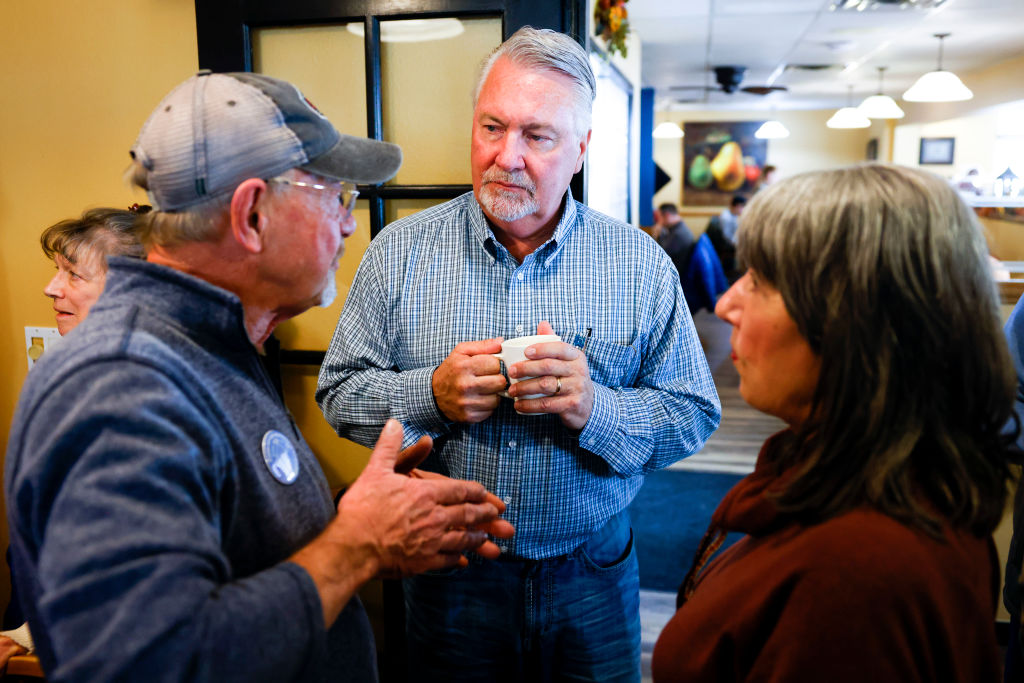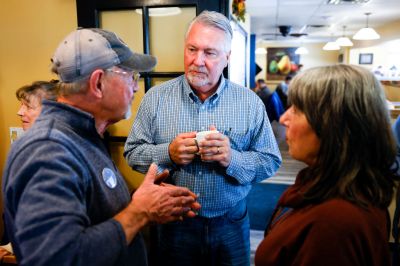BROOMFIELD, Colo.—Republicans in blue-leaning Colorado have long understood that winning statewide office means running to the center. In a few hours they’ll know whether longshot Senate candidate Joe O’Dea took that strategy too far.
O’Dea—who is trying to unseat Democratic Sen. Michael Bennet—has focused his campaign on crime, inflation, and President Joe Biden, who is unpopular in Colorado despite winning the state two years ago. But O’Dea has gone further than other GOP hopefuls in trying to broaden his appeal.
Broadening his appeal, by definition, includes distancing himself from the country’s most famous Republican. O’Dea has been outspoken about the legitimacy of Biden’s election. And he rails against the possibility of another presidential run by Donald Trump, who has denounced the candidate as “stupid” and a “RINO.”
O’Dea also has adopted moderate views on some issues. The self-styled “Republican Joe Manchin” laments this summer’s overturning of Roe v. Wade and supports the legalization of abortion through five months of pregnancy with exceptions for rape, incest, and life of the mother.
“He’s outside of the party platform on that issue,” state GOP Chair Kristi Burton Brown said of O’Dea’s position on abortion. Yet Brown still believes Republicans have an easy decision Tuesday: “It’s either going to be Joe O’Dea or Michael Bennet.”
It may be an easy choice for Republicans, but that doesn’t mean it’s an easy race. Biden carried the state by 13 points in 2020. Bennet has maintained a comfortable polling lead into Election Day, and most election analysts judge the race leans in the Democrats’ favor. But O’Dea has bet that unaffiliated voters—who now comprise more than 40 percent of Colorado’s voting population—will value his independence.
O’Dea often contrasts his would-be independent voting record with Bennet, who has voted with Biden 98 percent of the time. He maintains that if elected, he would keep Senate Minority Leader Mitch McConnell on his toes and buck the GOP party line on immigration, same-sex marriage and health care.
Yet abortion remains the thorniest topic.
“We don’t agree on everything. I accept that and I respect their opinion,” O’Dea said of his fellow Republicans during a recent interview at a Mexican restaurant in Broomfield, just outside Denver. “But Michael Bennet is an advocate for elective abortion up to an including the moment of birth, and then he wants to use taxpayer dollars to pay for it and that’s how he’s voted. To me, that’s extreme.”
Colorado hasn’t elected a Republican senator since 2014, when moderate Republican Cory Gardner beat Sen. Mark Udall in that year’s GOP wave. But after one successful term of reaching across the aisle on immigration and environmental-policy issues, Gardner stumped with Trump during their 2020 reelection campaigns and lost to former Democratic Gov. John Hickenlooper by nine points.
Democrats haven’t forgotten Gardner’s 2014 victory. “He was talented enough to pull off the tightrope for two years and then Donald Trump came along and exposed the whole game,” said Ian Silverii, a Colorado-based Democratic strategist. Silverii says O’Dea is “going to be subject to the same criticism: Did we not go moderate enough? Did we go too far to the right? Did we not go far to the right enough?”
O’Dea swats away the comparisons to Gardner: “I’m not Cory. Cory is not Joe,” O’Dea said. “I’m gonna be Joe. I’m going to be my own person.”
Democrats aren’t taking the race for granted. Bennet didn’t secure an outright majority in his first race 12 years ago or his second in 2016. This year the national environment is favorable to Republicans, and Benett’s holds only a tiny lead among independents. No wonder Democrats have had reason to be sober-minded—or even cynical.
A Chuck Schumer-aligned PAC spent $4 million ahead of the Republican Senate primary boosting O’Dea’s 2020 election-denying opponent, state Sen. Ron Hanks, in hopes that he’d be easier for Bennet to defeat in the general election. But O’Dea won by nine points, prompting outside Democratic PACs to flood the state with millions in television and radio advertisements since the June primary.
But national Republicans haven’t come to O’Dea’s aid in quite the same way. Even as high-profile Republican surrogates like former President George W. Bush hit the campaign trail, national Republicans have declined to invest heavily on his behalf. Instead they’ve funneled most of their resources into protecting Republican-held seats in Wisconsin, North Carolina, and Pennsylvania and going on offense in more competitive battlegrounds like Georgia, Nevada and even New Hampshire.
O’Dea is the first to admit he could have benefitted from more funding from outside Republican groups. But as he’s made his independence the focal point on the campaign trail, he hasn’t stopped to complain.
“Just yesterday, RealClearPolitics called this race a toss-up,” O’Dea told a small crowd of supporters in Broomfield on Saturday. “It’s going to be close.”







Please note that we at The Dispatch hold ourselves, our work, and our commenters to a higher standard than other places on the internet. We welcome comments that foster genuine debate or discussion—including comments critical of us or our work—but responses that include ad hominem attacks on fellow Dispatch members or are intended to stoke fear and anger may be moderated.
With your membership, you only have the ability to comment on The Morning Dispatch articles. Consider upgrading to join the conversation everywhere.